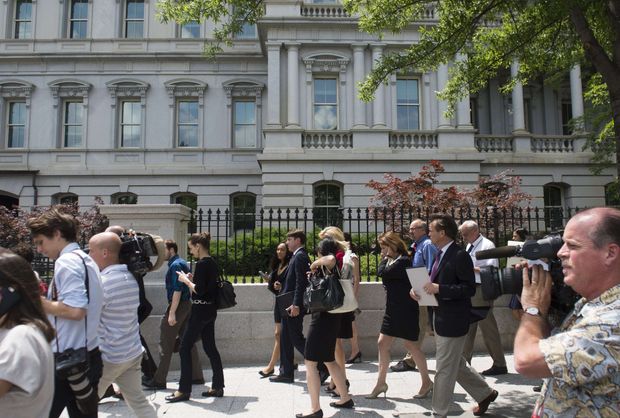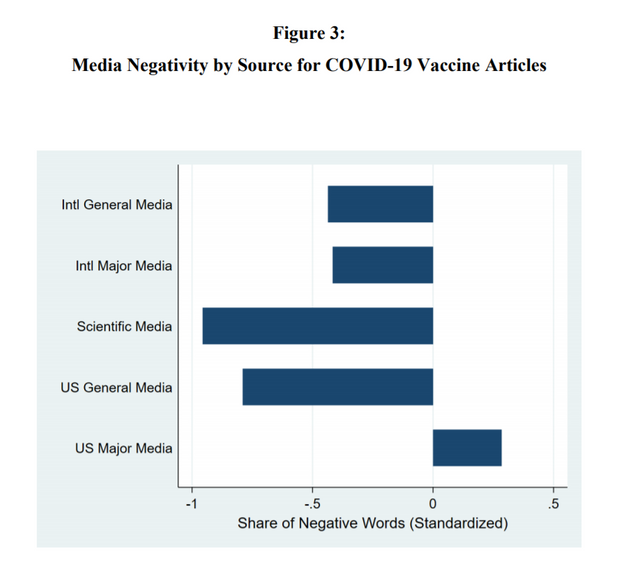
Relentlessly negative?
saul loeb/Agence France-Presse/Getty Images
It was sometime after the end of the first coronavirus wave that Bruce Sacerdote, a professor of economics at Dartmouth College, noticed something puzzling. “We were doing lots of staying at home and social distancing, and you could see the case numbers coming down, and I and my co-authors are watching the TV obsessively, and the news isn’t getting any better,” he said.
So he and his co-authors, Ranjan Sehgal of Dartmouth and Molly Cook of Brown University, decided to crunch the numbers. They analyzed the tone of COVID-19–related news stories appearing in the mainstream U.S. media and transcripts from television broadcasts — the likes of the New York Times, CNN and Fox News — and compared them to the content appearing in both international media outlets and scientific journals.
What they found, they say, was startling negativity in the mainstream U.S. media. For example, 90% of school-reopening articles from the U.S. mainstream media were negative, versus only 56% for the English-language media in other countries. Stories of increasing COVID-19 cases outnumbered stories about decreasing cases by a factor of 5.5 — even during periods when new cases were declining, according to a working paper circulated by the National Bureau of Economic Research.
An interesting finding is the negativity wasn’t correlated with partisanship — Fox News, for example, was as negative in tone as CNN. “The U.S. media are in this bizarre and impossible situation where you have this person in the White House doing these unusual things. And they feel compelled to cover it. At the same time, we don’t think of this as a Trump effect; we really think this is broader than that,” he said.
Could it be that the U.S. media reflect that the coronavirus pandemic has hit America harder than other English-language countries such as Australia and Canada? Sacerdote found that explanation wanting, pointing out that, with vaccines for example, the developments were the same across the world, and yet the U.S. coverage was far more negative.

“I think this is a very negative topic in general, and it should be more negative in the U.S. because our case numbers and our death rate is worse. But there’s these other indicators that still make it feel like we’re out of whack,” he said.
MarketWatch wasn’t included in the study, but upon request the authors studied 300 COVID articles, and found this publication three-quarters of a standard deviation less negative than mainstream U.S. outlets. Sacerdote had anticipated that finding, due to the business focus of the website. “The stock market, where people are betting billions of dollars on how things are going to go in the economy, there’s a lot of optimism around vaccines and getting this thing under control, and around getting some kind of stimulus passed,” he said. “They appear to be much more optimistic than the U.S. major media.”
The S&P 500 SPX, +0.89%, through Monday, has jumped 59% from its lows of March.
The U.S. media do one thing better than their international peers, however — they’re more likely to mention the benefits of mask wearing and social distancing. The working paper isn’t sure whether this prosocial message reflects a greater need for that messaging or not.
Sacerdote also has studied the stock-market trading of U.S. senators. “You know, they do about as well as if you had a monkey throwing darts,” he said. He’s now studying data on the U.S. House of Representatives, and, no, they’re not any better. “And so what’s unfortunate is how much time people are putting into this silly game, when obviously they have they have more important things that they could be doing,” he said.
From the archives (March 2020): Two senators under scrutiny over selling stock before the coronavirus market crash — but do insider-trading laws apply?
He teaches his undergraduate students that markets are really efficient, so stock-market trading is not a good use of time. “It’s amazing how that message is evergreen, and there’s always seems to be lots and lots of people who haven’t absorbed that. And, you know, many of them are in the Congress.”










Add Comment